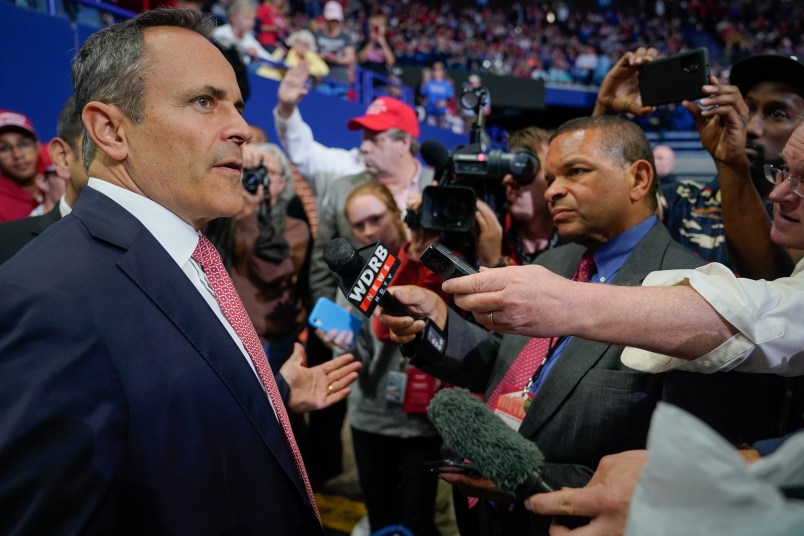Before state Attorney General Andy Beshear (D) took the stage to thank his supporters and celebrate his razor-thin victory in Tuesday’s Kentucky governor’s race, the incumbent was sounding the clarion call of how Republicans would respond to the loss.
“We know for a fact that there have been more than a few irregularities, they are very well corroborated, and that’s alright,” Gov. Matt Bevin (R) said, without naming specifics. “What they are exactly, how many, which ones and what effect, if any, they have, will be determined according to law that’s well established.”
“The process will be followed,” he continued. “And in the end, we will have the governor that was chosen by the people of Kentucky, and that’s the way the process should work.”
His Republican lackeys lost no time in scrambling to find a way around the unwelcome reality of Beshear’s win. State Senate Majority Leader Robert Stivers (R) floated just hours after the election results were tallied the option of a contest proceeding, or formally contesting the results of the election.
Kentucky Secretary of State Alison Lundergan Grimes (D) explained the “antiquated” procedure, found in the state’s constitution, to TPM.
“It hasn’t been used in a governor or lieutenant governor’s race in over 100 years,” she said. “What happens is an 11-member board comprised of members of the Senate and House are able to make an inquiry based on a specific statement made by a candidate pointing out errors in the election. In terms of what they could ultimately do, they could issue a new election.”
She said that the members of the board — eight from the House, three from the Senate — are “randomly selected” by House and Senate leadership. She pointed out that both chambers are currently run by a Republican majority.
“In 100 years, it has never been used to alter the will of the commonwealth of Kentucky’s voters as relates to the governor or lieutenant governor,” she added of the procedure. “And as Kentucky’s chief elections official, I am not aware of any irregularities that would swing a 5,000-vote margin.”
She noted that the other procedure available to Bevin is to ask for a re-canvass. She said that it’s much more common than the contest proceeding, and that she’s seen it carried out more than 20 times in her career. One of those instances was actually Bevin’s own primary in 2015, when he was separated by his opponent by just 83 votes. She added that she’s never seen the re-canvass process alter an election’s outcome.
A formal request for a re-canvass procedure would have to be submitted by Tuesday and the process conducted by Thursday. To contest the election, the request must be made 30 days after the state board of elections certifies the race.
There is no provision in state law for the offices of governor or lieutenant governor to request a recount.
Sam Marcosson, professor of constitutional law at the University of Louisville law school, pointed out the dangers of contesting the election, though he admitted that it may be the more attractive option to the Bevin camp, as a re-canvass is very unlikely to bridge a 5,000 vote gap.
“It certainly runs a huge risk of stripping voters of the right to make the choice. In theory, they have the possibility of using any pretext they wanted and overturn the election,” he told TPM. “Overturning a valid election brings up concerns about disenfranchisement and the legitimacy of the election itself.”
He added that an extreme move like that may be in violation of the federal Constitution, and its provisions of the right to vote and to a republican form of government.
“The federal Constitution would trump — no pun intended — anything in Kentucky, and that may put some real limits on anything that the General Assembly may try,” he added.
In short, attempting a maneuver as extreme as contesting the election, which Stivers floated, is a big risk for the assembly to take.
Stivers in particular has a personal connection to Bevin, as his wife is the governor’s deputy secretary of the Tourism, Arts and Heritage Cabinet. The Senate leader has said before that he would recuse himself from any decisions presenting a conflict of interest.
But, even setting Stivers’ situation aside, many Republicans in the General Assembly flat-out don’t like Bevin.
He has a famously bombastic temperament, and as Marcosson pointed out, has been on the receiving end of vetoes and attacks from his own party before.
No doubt that Kentucky Republicans are licking their wounds after Tuesday’s stinging loss, but time will tell if they ultimately consider Bevin worth upending the election and potentially getting into hot water with the U.S. Constitution.



